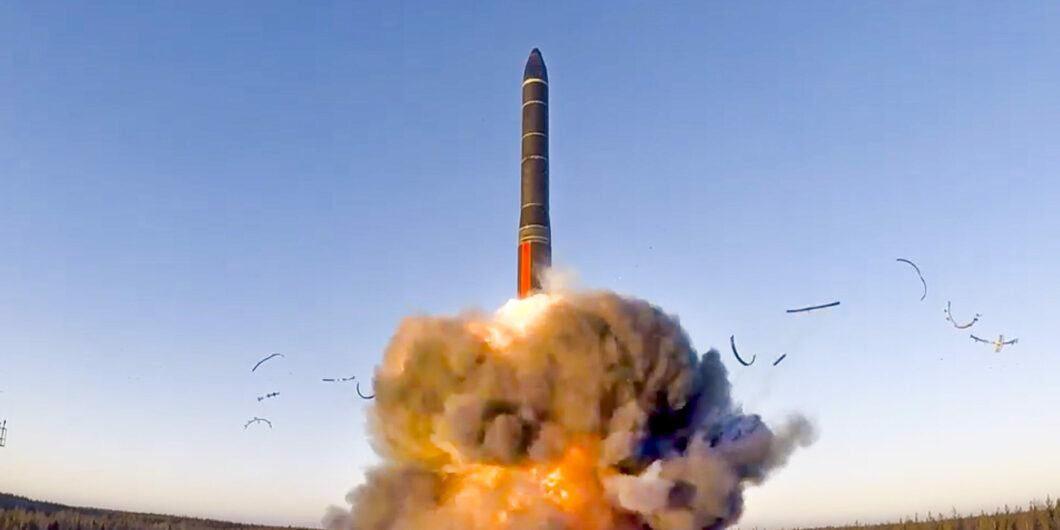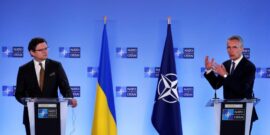The Nuclear Specter over Ukraine
“I wish we could sell them another hill at the same price we did Bunkers Hill…”
— Nathanael Greene, Continental Army, 1775
As Russia consolidates steady gains in Bakhmut, Ukrainians are wise to mind General Greene’s timeless quip about the nature of tactical “losses” against an enemy’s attritional disasters. By some estimates, Russia has lost up to 17,000 troops (mercenary and mainline) in their bid to take the town. Russia’s neo-Soviet strategy, like its historical precursor, is to choke its opponent’s meat-grinder with sheer mass—gambling that it can absorb more losses than its adversary. The strategy, brutal as it may be, can work. Think Stalingrad. The Ukrainians, for their part, need to allow Russia to continue to fall on its sword, selling them so many Bakhmuts that it threatens the cohesion of the Russian Federation itself.
The strategy of overwhelming mass works, after all, up until it doesn’t. The Soviet invasion of Afghanistan is a useful analog: the 15,000 body bags sent back to the Kremlin were a precipitating factor in the collapse of the Soviet Union itself. I spoke with a current Ukrainian defender, a former Soviet fighter in Afghanistan, who remembers that the “anger” at deaths in Afghanistan, coupled with the “hunger” at home led inexorably to the protests that rocked Moscow to its core. Anger and Hunger. It remains to be seen whether Russia, suffering the losses in one town that the Soviets suffered in ten years in Afghanistan, will lead to the sort of internal pressure that will blow the lid off a poorly united federation. But we can hope.
Or should we? What about our interests? One can be morally inspired by the plucky courage of Ukrainian resistance, and even dedicate substantial personal resources to its defense while still wondering what it is we’re all getting into. President Biden, for his part, tells us we are committed to “however long it takes” to defend Ukraine’s freedom, but does this include obliterating Moscow in a retaliatory strike amidst a runaway nuclear standoff?
The war in Ukraine, and the nuclear specter it has unleashed, has generated two competing schools of thought on how best to address the current nuclear threat. Eric Schlosser, writing in The Atlantic, represents one view: the long-term solution to escalating nuclear tensions worldwide is to “ban” nuclear weapons and “stigmatize” their use. Somewhat counterintuitively, he suggests the best way to do this in the Ukraine conflict is to double-down on arms shipments and not succumb to the nuclear “blackmail” that Russia has been wielding. Anne Applebaum makes a similar point, suggesting that fear is warping our strategic sensibilities and wonders whether “restraint” might actually be emboldening the aggressor. These are fair arguments, to be sure. Yet when doves of the Left suddenly sprout titanium claws, it’s worth pausing.
The other school of thought, espoused by the likes of Will Ruger, toes a more cautious, or as he likes to say, “prudential” line: why risk pushing a nuclear-armed foe to the brink of nuclear annihilation when no demonstrable national interest is at play? Also a fair point.
If the West can control its showy displays of lethal aid, allowing time for internal pressure to build, it may help us avoid the prospect of Russia lashing out with a nuclear blow.
But it seems to me that both sides are missing the mark. Focused as they are on weapons deliveries (“more” versus ”less,” respectively) they discount the basic strategic aim of warfare which is to dissolve the opponent’s will to fight. Weapons are clearly a part of this calculus, but the more important element is the fundamental narrative at play. Anger and Hunger have not yet come to dominate the Russian people’s outlook: only time can do that.
Meanwhile, the increasing giddiness of the West to supply ever-greater stocks of ever-more advanced weaponry plays perfectly into the budding Putin narrative that it is he who is the hapless victim, that the Ukraine conflict is actually an existential battle between Mother Russia and an evil, aggressive West. Foreign Minister Lavrov claimed as much at the G20, to howls of laughter. But he believes it and so do millions of Russians like him. With every pronouncement that the West will do “whatever it takes,” to defeat Russia on the battlefield, we foolishly further the enemy’s false narrative and harden the common Russian resolve. Worse, we simultaneously detract from the narrative of Ukraine’s own spirited self-defense—we risk promoting this as a victory of Raytheon, Boeing, and Lockheed rather than the hardened warriors sticking it out in the trenches of the Donbas.
There is entirely too much crowing going on, in other words. Capitulation to nuclear blackmail is, of course, no way to live and we should certainly not step away. But since we have the wolf by the proverbial ears, it seems the better part of wisdom now is to tone down the rhetoric, more quietly arm Ukrainian defenses, and let Ukrainians “sell” more Bakhmuts. It’s a bitter pill, to be sure, but the alternatives are ghastlier still.
One way around this is to significantly temper the media narrative and overt advertising of weapons deliveries. Public expressions of solidarity with Ukraine’s cause are fine, but we should not go out of our way to call attention to the latest armaments shipments or yet another round of aid packages. We need to shape the international narrative on this, and that does not mean whipping allies into a frenzy of ever greater direct contribution to the conflict or further finger wagging at China. Rather, we need to speak more softly while lending the big stick—expressing a calm and quiet resolve to support a free people.
Ultimately, if Russia mires itself further in central Ukraine, its momentum can be its own undoing. Even if it means giving up hard-won territory in isolated structured retreats, the strategic benefits are vast. There are trenches prepared a thousand miles from the front (I’ve seen them), and Russia cannot hope to maintain any substantial breakthrough or occupation. Let Russian units camp for months in central Ukraine with extended supply lines and exposed flanks. Allow the meat-grinder to roll on.
Meanwhile, if the West can control its showy displays of lethal aid, allowing time for internal pressure to build, it may help us avoid the prospect of Russia lashing out with a nuclear blow. The final blow, after all, may come from within.



